Contemporary Issues in Health With Respect to Health Models
VerifiedAdded on 2022/09/08
|10
|2772
|16
AI Summary
Contribute Materials
Your contribution can guide someone’s learning journey. Share your
documents today.

Contemporary issues in health
Secure Best Marks with AI Grader
Need help grading? Try our AI Grader for instant feedback on your assignments.
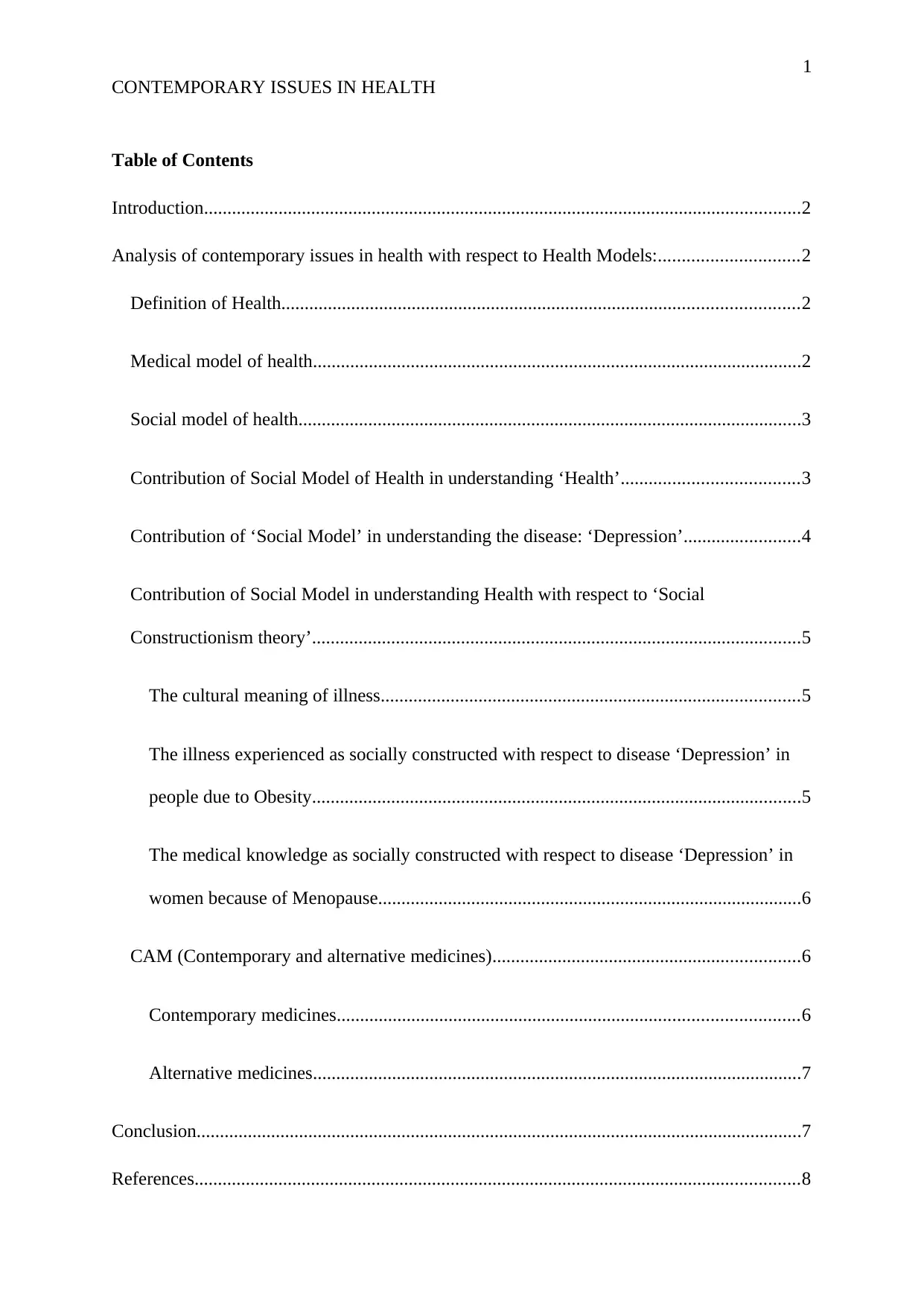
1
CONTEMPORARY ISSUES IN HEALTH
Table of Contents
Introduction................................................................................................................................2
Analysis of contemporary issues in health with respect to Health Models:..............................2
Definition of Health...............................................................................................................2
Medical model of health.........................................................................................................2
Social model of health............................................................................................................3
Contribution of Social Model of Health in understanding ‘Health’......................................3
Contribution of ‘Social Model’ in understanding the disease: ‘Depression’.........................4
Contribution of Social Model in understanding Health with respect to ‘Social
Constructionism theory’.........................................................................................................5
The cultural meaning of illness..........................................................................................5
The illness experienced as socially constructed with respect to disease ‘Depression’ in
people due to Obesity.........................................................................................................5
The medical knowledge as socially constructed with respect to disease ‘Depression’ in
women because of Menopause...........................................................................................6
CAM (Contemporary and alternative medicines)..................................................................6
Contemporary medicines...................................................................................................6
Alternative medicines.........................................................................................................7
Conclusion..................................................................................................................................7
References..................................................................................................................................8
CONTEMPORARY ISSUES IN HEALTH
Table of Contents
Introduction................................................................................................................................2
Analysis of contemporary issues in health with respect to Health Models:..............................2
Definition of Health...............................................................................................................2
Medical model of health.........................................................................................................2
Social model of health............................................................................................................3
Contribution of Social Model of Health in understanding ‘Health’......................................3
Contribution of ‘Social Model’ in understanding the disease: ‘Depression’.........................4
Contribution of Social Model in understanding Health with respect to ‘Social
Constructionism theory’.........................................................................................................5
The cultural meaning of illness..........................................................................................5
The illness experienced as socially constructed with respect to disease ‘Depression’ in
people due to Obesity.........................................................................................................5
The medical knowledge as socially constructed with respect to disease ‘Depression’ in
women because of Menopause...........................................................................................6
CAM (Contemporary and alternative medicines)..................................................................6
Contemporary medicines...................................................................................................6
Alternative medicines.........................................................................................................7
Conclusion..................................................................................................................................7
References..................................................................................................................................8
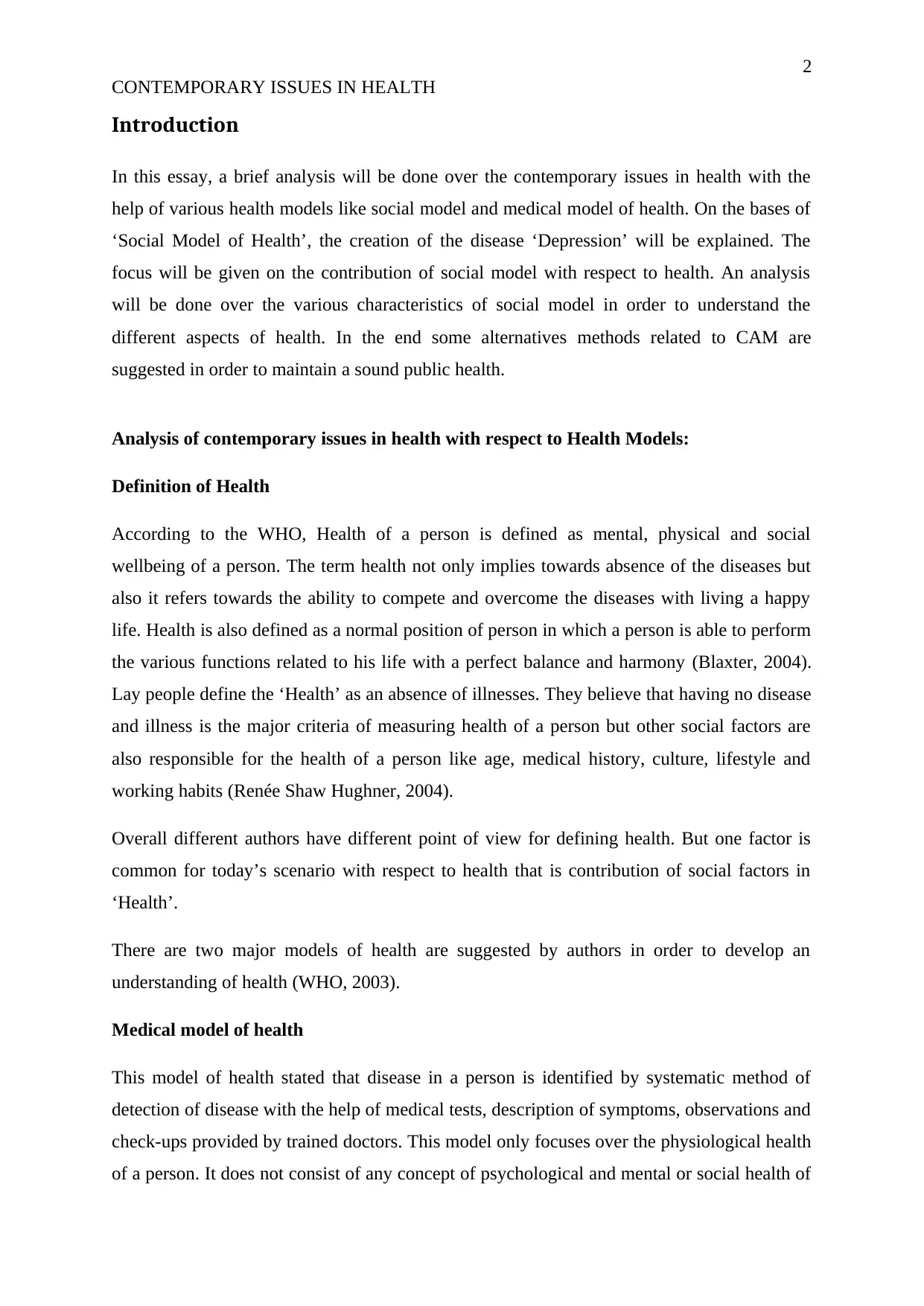
2
CONTEMPORARY ISSUES IN HEALTH
Introduction
In this essay, a brief analysis will be done over the contemporary issues in health with the
help of various health models like social model and medical model of health. On the bases of
‘Social Model of Health’, the creation of the disease ‘Depression’ will be explained. The
focus will be given on the contribution of social model with respect to health. An analysis
will be done over the various characteristics of social model in order to understand the
different aspects of health. In the end some alternatives methods related to CAM are
suggested in order to maintain a sound public health.
Analysis of contemporary issues in health with respect to Health Models:
Definition of Health
According to the WHO, Health of a person is defined as mental, physical and social
wellbeing of a person. The term health not only implies towards absence of the diseases but
also it refers towards the ability to compete and overcome the diseases with living a happy
life. Health is also defined as a normal position of person in which a person is able to perform
the various functions related to his life with a perfect balance and harmony (Blaxter, 2004).
Lay people define the ‘Health’ as an absence of illnesses. They believe that having no disease
and illness is the major criteria of measuring health of a person but other social factors are
also responsible for the health of a person like age, medical history, culture, lifestyle and
working habits (Renée Shaw Hughner, 2004).
Overall different authors have different point of view for defining health. But one factor is
common for today’s scenario with respect to health that is contribution of social factors in
‘Health’.
There are two major models of health are suggested by authors in order to develop an
understanding of health (WHO, 2003).
Medical model of health
This model of health stated that disease in a person is identified by systematic method of
detection of disease with the help of medical tests, description of symptoms, observations and
check-ups provided by trained doctors. This model only focuses over the physiological health
of a person. It does not consist of any concept of psychological and mental or social health of
CONTEMPORARY ISSUES IN HEALTH
Introduction
In this essay, a brief analysis will be done over the contemporary issues in health with the
help of various health models like social model and medical model of health. On the bases of
‘Social Model of Health’, the creation of the disease ‘Depression’ will be explained. The
focus will be given on the contribution of social model with respect to health. An analysis
will be done over the various characteristics of social model in order to understand the
different aspects of health. In the end some alternatives methods related to CAM are
suggested in order to maintain a sound public health.
Analysis of contemporary issues in health with respect to Health Models:
Definition of Health
According to the WHO, Health of a person is defined as mental, physical and social
wellbeing of a person. The term health not only implies towards absence of the diseases but
also it refers towards the ability to compete and overcome the diseases with living a happy
life. Health is also defined as a normal position of person in which a person is able to perform
the various functions related to his life with a perfect balance and harmony (Blaxter, 2004).
Lay people define the ‘Health’ as an absence of illnesses. They believe that having no disease
and illness is the major criteria of measuring health of a person but other social factors are
also responsible for the health of a person like age, medical history, culture, lifestyle and
working habits (Renée Shaw Hughner, 2004).
Overall different authors have different point of view for defining health. But one factor is
common for today’s scenario with respect to health that is contribution of social factors in
‘Health’.
There are two major models of health are suggested by authors in order to develop an
understanding of health (WHO, 2003).
Medical model of health
This model of health stated that disease in a person is identified by systematic method of
detection of disease with the help of medical tests, description of symptoms, observations and
check-ups provided by trained doctors. This model only focuses over the physiological health
of a person. It does not consist of any concept of psychological and mental or social health of
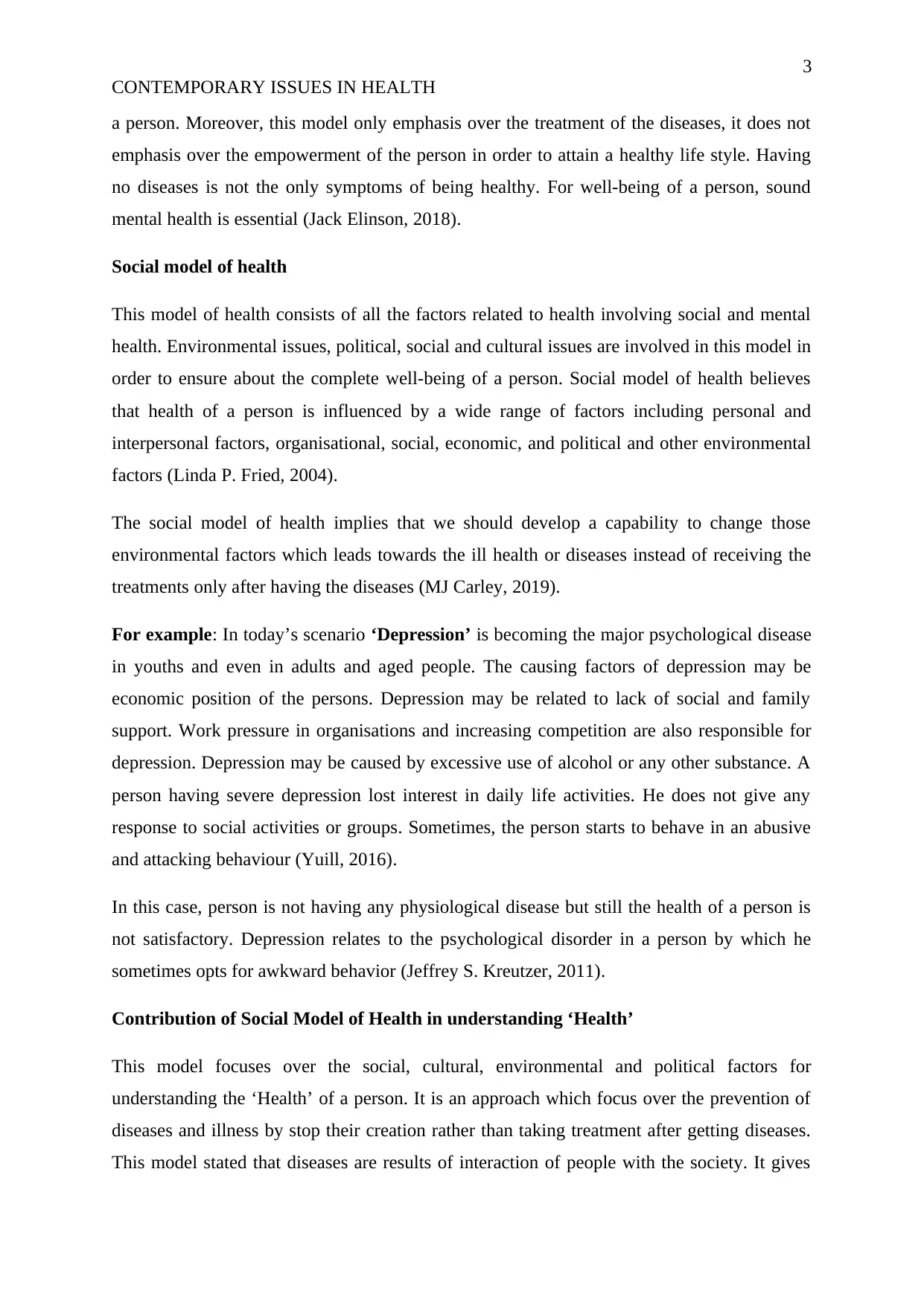
3
CONTEMPORARY ISSUES IN HEALTH
a person. Moreover, this model only emphasis over the treatment of the diseases, it does not
emphasis over the empowerment of the person in order to attain a healthy life style. Having
no diseases is not the only symptoms of being healthy. For well-being of a person, sound
mental health is essential (Jack Elinson, 2018).
Social model of health
This model of health consists of all the factors related to health involving social and mental
health. Environmental issues, political, social and cultural issues are involved in this model in
order to ensure about the complete well-being of a person. Social model of health believes
that health of a person is influenced by a wide range of factors including personal and
interpersonal factors, organisational, social, economic, and political and other environmental
factors (Linda P. Fried, 2004).
The social model of health implies that we should develop a capability to change those
environmental factors which leads towards the ill health or diseases instead of receiving the
treatments only after having the diseases (MJ Carley, 2019).
For example: In today’s scenario ‘Depression’ is becoming the major psychological disease
in youths and even in adults and aged people. The causing factors of depression may be
economic position of the persons. Depression may be related to lack of social and family
support. Work pressure in organisations and increasing competition are also responsible for
depression. Depression may be caused by excessive use of alcohol or any other substance. A
person having severe depression lost interest in daily life activities. He does not give any
response to social activities or groups. Sometimes, the person starts to behave in an abusive
and attacking behaviour (Yuill, 2016).
In this case, person is not having any physiological disease but still the health of a person is
not satisfactory. Depression relates to the psychological disorder in a person by which he
sometimes opts for awkward behavior (Jeffrey S. Kreutzer, 2011).
Contribution of Social Model of Health in understanding ‘Health’
This model focuses over the social, cultural, environmental and political factors for
understanding the ‘Health’ of a person. It is an approach which focus over the prevention of
diseases and illness by stop their creation rather than taking treatment after getting diseases.
This model stated that diseases are results of interaction of people with the society. It gives
CONTEMPORARY ISSUES IN HEALTH
a person. Moreover, this model only emphasis over the treatment of the diseases, it does not
emphasis over the empowerment of the person in order to attain a healthy life style. Having
no diseases is not the only symptoms of being healthy. For well-being of a person, sound
mental health is essential (Jack Elinson, 2018).
Social model of health
This model of health consists of all the factors related to health involving social and mental
health. Environmental issues, political, social and cultural issues are involved in this model in
order to ensure about the complete well-being of a person. Social model of health believes
that health of a person is influenced by a wide range of factors including personal and
interpersonal factors, organisational, social, economic, and political and other environmental
factors (Linda P. Fried, 2004).
The social model of health implies that we should develop a capability to change those
environmental factors which leads towards the ill health or diseases instead of receiving the
treatments only after having the diseases (MJ Carley, 2019).
For example: In today’s scenario ‘Depression’ is becoming the major psychological disease
in youths and even in adults and aged people. The causing factors of depression may be
economic position of the persons. Depression may be related to lack of social and family
support. Work pressure in organisations and increasing competition are also responsible for
depression. Depression may be caused by excessive use of alcohol or any other substance. A
person having severe depression lost interest in daily life activities. He does not give any
response to social activities or groups. Sometimes, the person starts to behave in an abusive
and attacking behaviour (Yuill, 2016).
In this case, person is not having any physiological disease but still the health of a person is
not satisfactory. Depression relates to the psychological disorder in a person by which he
sometimes opts for awkward behavior (Jeffrey S. Kreutzer, 2011).
Contribution of Social Model of Health in understanding ‘Health’
This model focuses over the social, cultural, environmental and political factors for
understanding the ‘Health’ of a person. It is an approach which focus over the prevention of
diseases and illness by stop their creation rather than taking treatment after getting diseases.
This model stated that diseases are results of interaction of people with the society. It gives
Secure Best Marks with AI Grader
Need help grading? Try our AI Grader for instant feedback on your assignments.
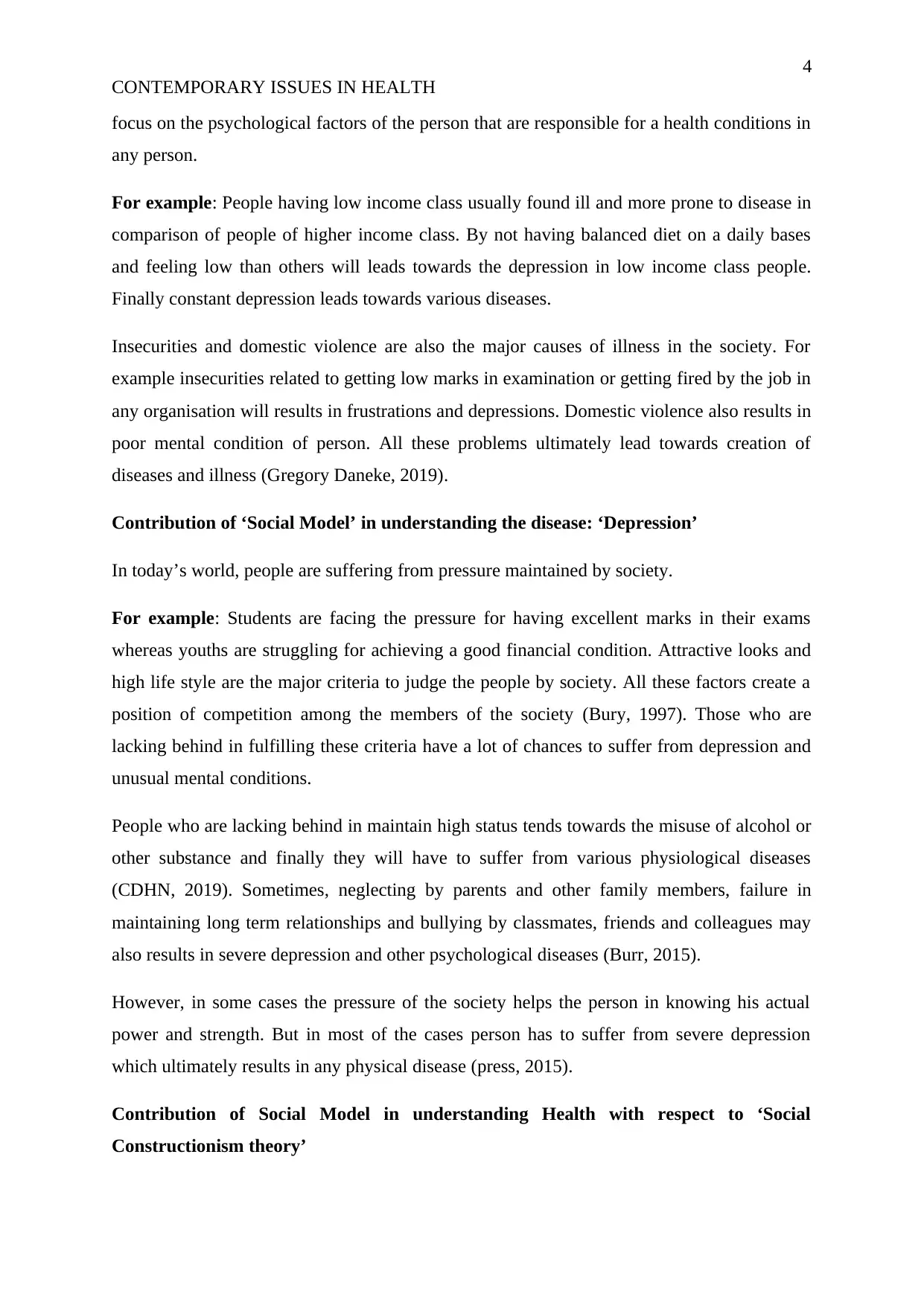
4
CONTEMPORARY ISSUES IN HEALTH
focus on the psychological factors of the person that are responsible for a health conditions in
any person.
For example: People having low income class usually found ill and more prone to disease in
comparison of people of higher income class. By not having balanced diet on a daily bases
and feeling low than others will leads towards the depression in low income class people.
Finally constant depression leads towards various diseases.
Insecurities and domestic violence are also the major causes of illness in the society. For
example insecurities related to getting low marks in examination or getting fired by the job in
any organisation will results in frustrations and depressions. Domestic violence also results in
poor mental condition of person. All these problems ultimately lead towards creation of
diseases and illness (Gregory Daneke, 2019).
Contribution of ‘Social Model’ in understanding the disease: ‘Depression’
In today’s world, people are suffering from pressure maintained by society.
For example: Students are facing the pressure for having excellent marks in their exams
whereas youths are struggling for achieving a good financial condition. Attractive looks and
high life style are the major criteria to judge the people by society. All these factors create a
position of competition among the members of the society (Bury, 1997). Those who are
lacking behind in fulfilling these criteria have a lot of chances to suffer from depression and
unusual mental conditions.
People who are lacking behind in maintain high status tends towards the misuse of alcohol or
other substance and finally they will have to suffer from various physiological diseases
(CDHN, 2019). Sometimes, neglecting by parents and other family members, failure in
maintaining long term relationships and bullying by classmates, friends and colleagues may
also results in severe depression and other psychological diseases (Burr, 2015).
However, in some cases the pressure of the society helps the person in knowing his actual
power and strength. But in most of the cases person has to suffer from severe depression
which ultimately results in any physical disease (press, 2015).
Contribution of Social Model in understanding Health with respect to ‘Social
Constructionism theory’
CONTEMPORARY ISSUES IN HEALTH
focus on the psychological factors of the person that are responsible for a health conditions in
any person.
For example: People having low income class usually found ill and more prone to disease in
comparison of people of higher income class. By not having balanced diet on a daily bases
and feeling low than others will leads towards the depression in low income class people.
Finally constant depression leads towards various diseases.
Insecurities and domestic violence are also the major causes of illness in the society. For
example insecurities related to getting low marks in examination or getting fired by the job in
any organisation will results in frustrations and depressions. Domestic violence also results in
poor mental condition of person. All these problems ultimately lead towards creation of
diseases and illness (Gregory Daneke, 2019).
Contribution of ‘Social Model’ in understanding the disease: ‘Depression’
In today’s world, people are suffering from pressure maintained by society.
For example: Students are facing the pressure for having excellent marks in their exams
whereas youths are struggling for achieving a good financial condition. Attractive looks and
high life style are the major criteria to judge the people by society. All these factors create a
position of competition among the members of the society (Bury, 1997). Those who are
lacking behind in fulfilling these criteria have a lot of chances to suffer from depression and
unusual mental conditions.
People who are lacking behind in maintain high status tends towards the misuse of alcohol or
other substance and finally they will have to suffer from various physiological diseases
(CDHN, 2019). Sometimes, neglecting by parents and other family members, failure in
maintaining long term relationships and bullying by classmates, friends and colleagues may
also results in severe depression and other psychological diseases (Burr, 2015).
However, in some cases the pressure of the society helps the person in knowing his actual
power and strength. But in most of the cases person has to suffer from severe depression
which ultimately results in any physical disease (press, 2015).
Contribution of Social Model in understanding Health with respect to ‘Social
Constructionism theory’
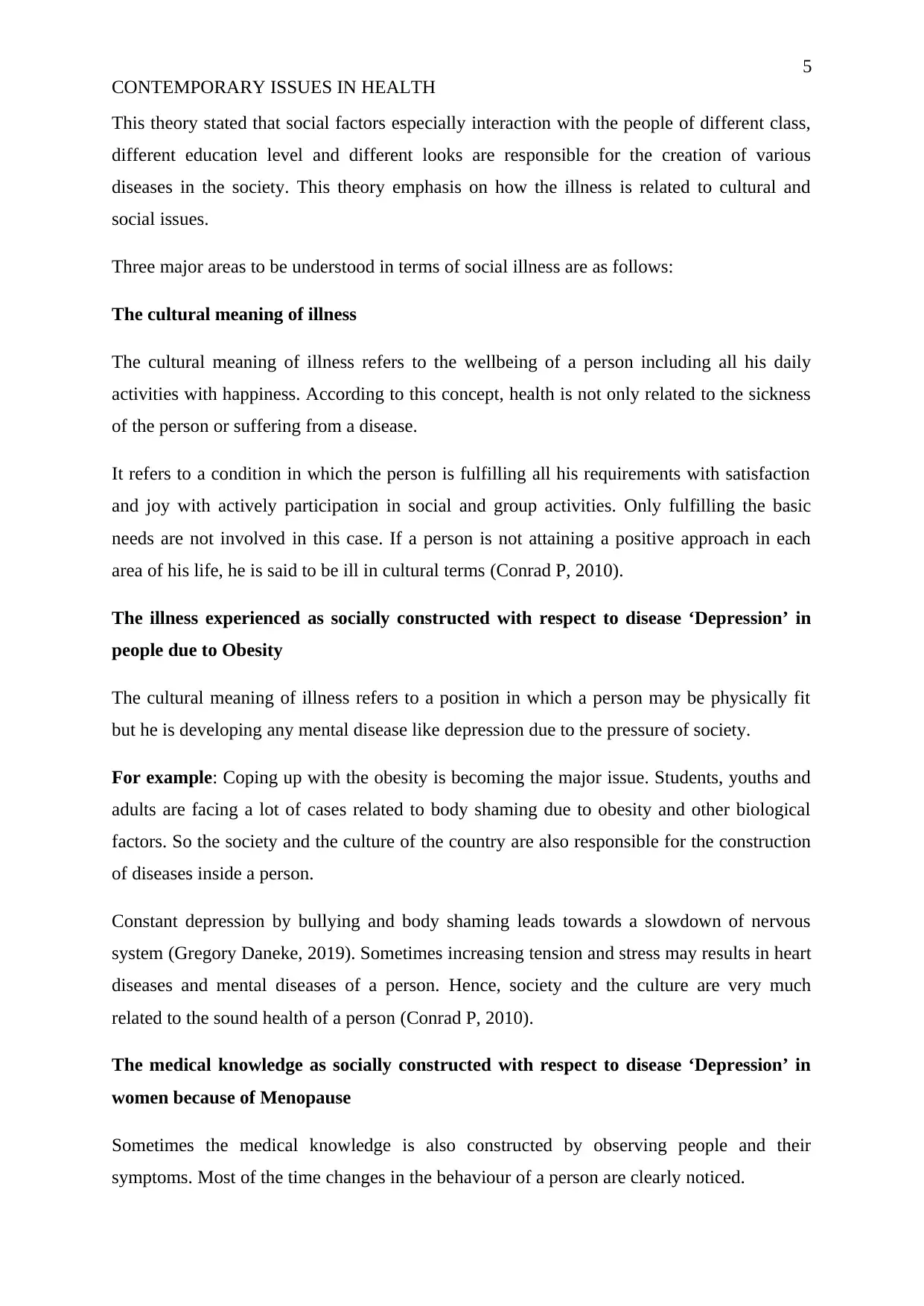
5
CONTEMPORARY ISSUES IN HEALTH
This theory stated that social factors especially interaction with the people of different class,
different education level and different looks are responsible for the creation of various
diseases in the society. This theory emphasis on how the illness is related to cultural and
social issues.
Three major areas to be understood in terms of social illness are as follows:
The cultural meaning of illness
The cultural meaning of illness refers to the wellbeing of a person including all his daily
activities with happiness. According to this concept, health is not only related to the sickness
of the person or suffering from a disease.
It refers to a condition in which the person is fulfilling all his requirements with satisfaction
and joy with actively participation in social and group activities. Only fulfilling the basic
needs are not involved in this case. If a person is not attaining a positive approach in each
area of his life, he is said to be ill in cultural terms (Conrad P, 2010).
The illness experienced as socially constructed with respect to disease ‘Depression’ in
people due to Obesity
The cultural meaning of illness refers to a position in which a person may be physically fit
but he is developing any mental disease like depression due to the pressure of society.
For example: Coping up with the obesity is becoming the major issue. Students, youths and
adults are facing a lot of cases related to body shaming due to obesity and other biological
factors. So the society and the culture of the country are also responsible for the construction
of diseases inside a person.
Constant depression by bullying and body shaming leads towards a slowdown of nervous
system (Gregory Daneke, 2019). Sometimes increasing tension and stress may results in heart
diseases and mental diseases of a person. Hence, society and the culture are very much
related to the sound health of a person (Conrad P, 2010).
The medical knowledge as socially constructed with respect to disease ‘Depression’ in
women because of Menopause
Sometimes the medical knowledge is also constructed by observing people and their
symptoms. Most of the time changes in the behaviour of a person are clearly noticed.
CONTEMPORARY ISSUES IN HEALTH
This theory stated that social factors especially interaction with the people of different class,
different education level and different looks are responsible for the creation of various
diseases in the society. This theory emphasis on how the illness is related to cultural and
social issues.
Three major areas to be understood in terms of social illness are as follows:
The cultural meaning of illness
The cultural meaning of illness refers to the wellbeing of a person including all his daily
activities with happiness. According to this concept, health is not only related to the sickness
of the person or suffering from a disease.
It refers to a condition in which the person is fulfilling all his requirements with satisfaction
and joy with actively participation in social and group activities. Only fulfilling the basic
needs are not involved in this case. If a person is not attaining a positive approach in each
area of his life, he is said to be ill in cultural terms (Conrad P, 2010).
The illness experienced as socially constructed with respect to disease ‘Depression’ in
people due to Obesity
The cultural meaning of illness refers to a position in which a person may be physically fit
but he is developing any mental disease like depression due to the pressure of society.
For example: Coping up with the obesity is becoming the major issue. Students, youths and
adults are facing a lot of cases related to body shaming due to obesity and other biological
factors. So the society and the culture of the country are also responsible for the construction
of diseases inside a person.
Constant depression by bullying and body shaming leads towards a slowdown of nervous
system (Gregory Daneke, 2019). Sometimes increasing tension and stress may results in heart
diseases and mental diseases of a person. Hence, society and the culture are very much
related to the sound health of a person (Conrad P, 2010).
The medical knowledge as socially constructed with respect to disease ‘Depression’ in
women because of Menopause
Sometimes the medical knowledge is also constructed by observing people and their
symptoms. Most of the time changes in the behaviour of a person are clearly noticed.
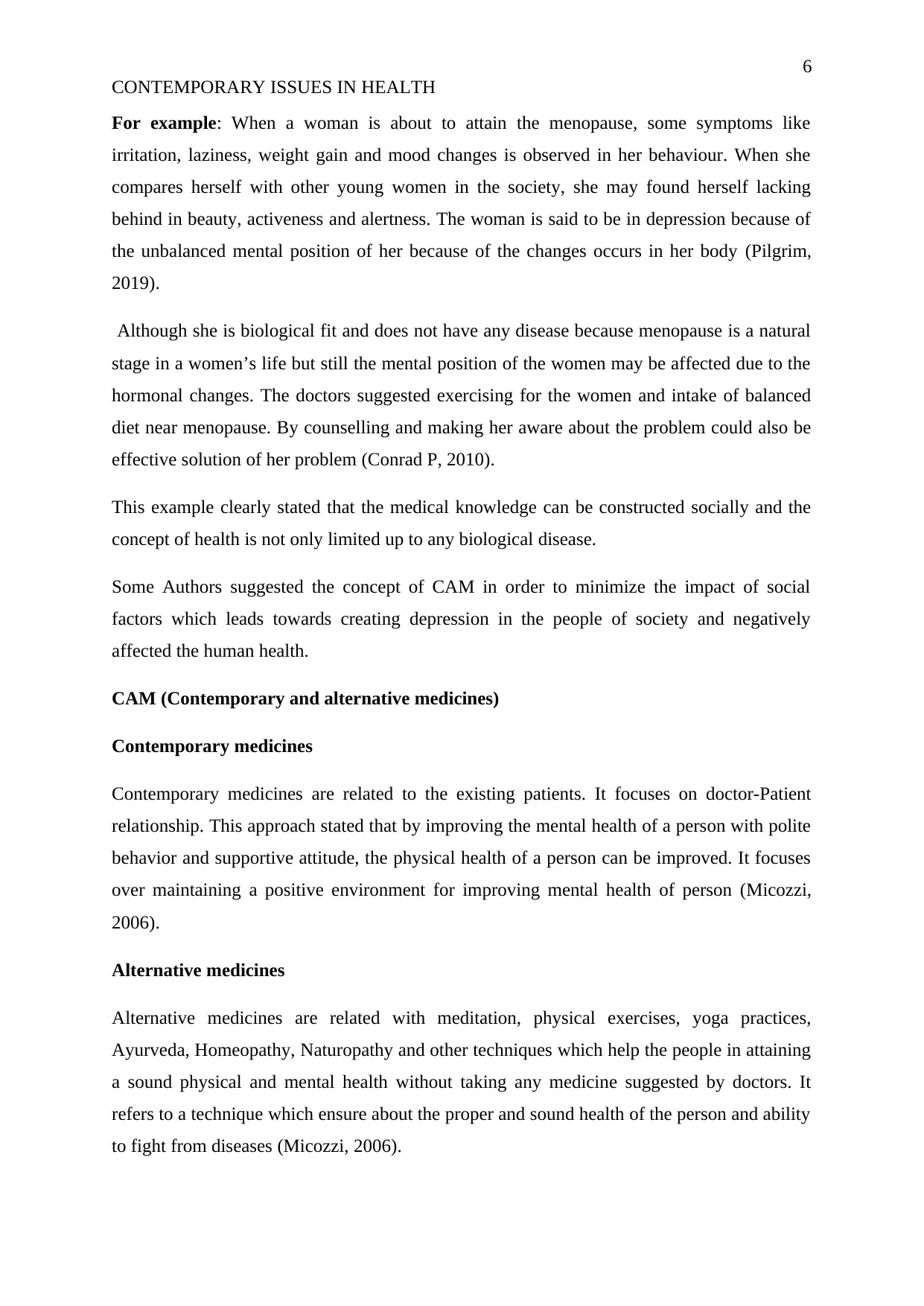
6
CONTEMPORARY ISSUES IN HEALTH
For example: When a woman is about to attain the menopause, some symptoms like
irritation, laziness, weight gain and mood changes is observed in her behaviour. When she
compares herself with other young women in the society, she may found herself lacking
behind in beauty, activeness and alertness. The woman is said to be in depression because of
the unbalanced mental position of her because of the changes occurs in her body (Pilgrim,
2019).
Although she is biological fit and does not have any disease because menopause is a natural
stage in a women’s life but still the mental position of the women may be affected due to the
hormonal changes. The doctors suggested exercising for the women and intake of balanced
diet near menopause. By counselling and making her aware about the problem could also be
effective solution of her problem (Conrad P, 2010).
This example clearly stated that the medical knowledge can be constructed socially and the
concept of health is not only limited up to any biological disease.
Some Authors suggested the concept of CAM in order to minimize the impact of social
factors which leads towards creating depression in the people of society and negatively
affected the human health.
CAM (Contemporary and alternative medicines)
Contemporary medicines
Contemporary medicines are related to the existing patients. It focuses on doctor-Patient
relationship. This approach stated that by improving the mental health of a person with polite
behavior and supportive attitude, the physical health of a person can be improved. It focuses
over maintaining a positive environment for improving mental health of person (Micozzi,
2006).
Alternative medicines
Alternative medicines are related with meditation, physical exercises, yoga practices,
Ayurveda, Homeopathy, Naturopathy and other techniques which help the people in attaining
a sound physical and mental health without taking any medicine suggested by doctors. It
refers to a technique which ensure about the proper and sound health of the person and ability
to fight from diseases (Micozzi, 2006).
CONTEMPORARY ISSUES IN HEALTH
For example: When a woman is about to attain the menopause, some symptoms like
irritation, laziness, weight gain and mood changes is observed in her behaviour. When she
compares herself with other young women in the society, she may found herself lacking
behind in beauty, activeness and alertness. The woman is said to be in depression because of
the unbalanced mental position of her because of the changes occurs in her body (Pilgrim,
2019).
Although she is biological fit and does not have any disease because menopause is a natural
stage in a women’s life but still the mental position of the women may be affected due to the
hormonal changes. The doctors suggested exercising for the women and intake of balanced
diet near menopause. By counselling and making her aware about the problem could also be
effective solution of her problem (Conrad P, 2010).
This example clearly stated that the medical knowledge can be constructed socially and the
concept of health is not only limited up to any biological disease.
Some Authors suggested the concept of CAM in order to minimize the impact of social
factors which leads towards creating depression in the people of society and negatively
affected the human health.
CAM (Contemporary and alternative medicines)
Contemporary medicines
Contemporary medicines are related to the existing patients. It focuses on doctor-Patient
relationship. This approach stated that by improving the mental health of a person with polite
behavior and supportive attitude, the physical health of a person can be improved. It focuses
over maintaining a positive environment for improving mental health of person (Micozzi,
2006).
Alternative medicines
Alternative medicines are related with meditation, physical exercises, yoga practices,
Ayurveda, Homeopathy, Naturopathy and other techniques which help the people in attaining
a sound physical and mental health without taking any medicine suggested by doctors. It
refers to a technique which ensure about the proper and sound health of the person and ability
to fight from diseases (Micozzi, 2006).
Paraphrase This Document
Need a fresh take? Get an instant paraphrase of this document with our AI Paraphraser
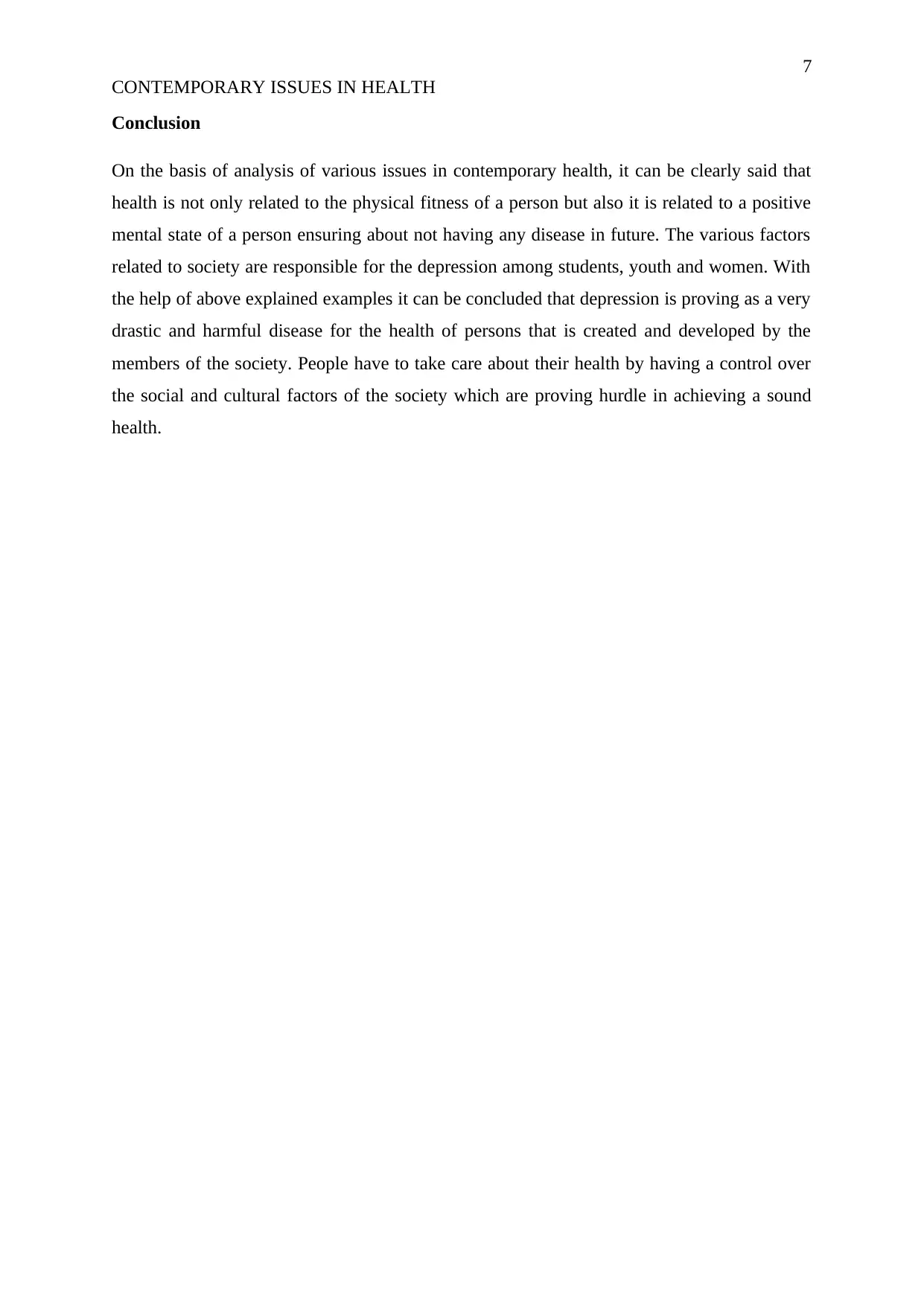
7
CONTEMPORARY ISSUES IN HEALTH
Conclusion
On the basis of analysis of various issues in contemporary health, it can be clearly said that
health is not only related to the physical fitness of a person but also it is related to a positive
mental state of a person ensuring about not having any disease in future. The various factors
related to society are responsible for the depression among students, youth and women. With
the help of above explained examples it can be concluded that depression is proving as a very
drastic and harmful disease for the health of persons that is created and developed by the
members of the society. People have to take care about their health by having a control over
the social and cultural factors of the society which are proving hurdle in achieving a sound
health.
CONTEMPORARY ISSUES IN HEALTH
Conclusion
On the basis of analysis of various issues in contemporary health, it can be clearly said that
health is not only related to the physical fitness of a person but also it is related to a positive
mental state of a person ensuring about not having any disease in future. The various factors
related to society are responsible for the depression among students, youth and women. With
the help of above explained examples it can be concluded that depression is proving as a very
drastic and harmful disease for the health of persons that is created and developed by the
members of the society. People have to take care about their health by having a control over
the social and cultural factors of the society which are proving hurdle in achieving a sound
health.
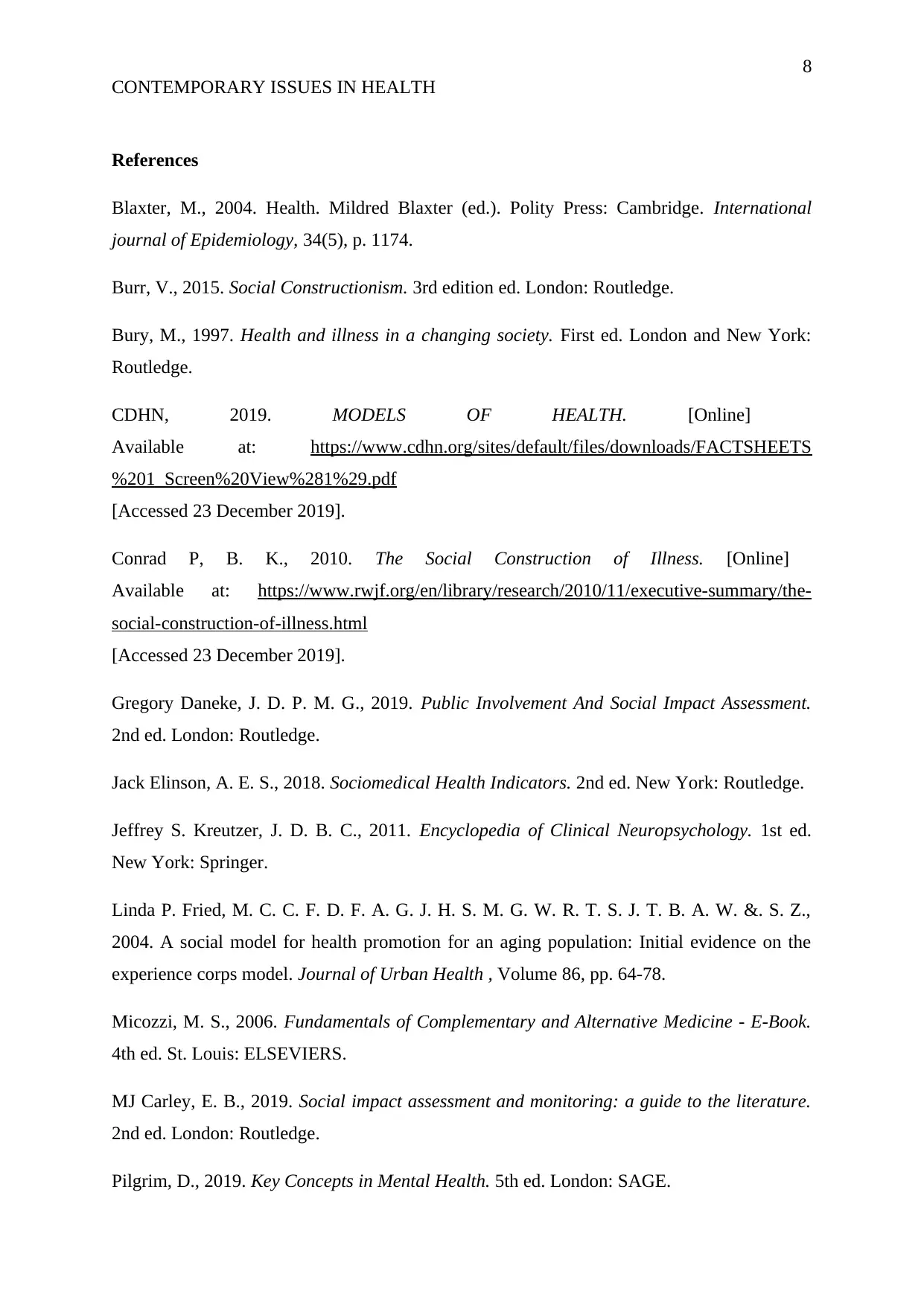
8
CONTEMPORARY ISSUES IN HEALTH
References
Blaxter, M., 2004. Health. Mildred Blaxter (ed.). Polity Press: Cambridge. International
journal of Epidemiology, 34(5), p. 1174.
Burr, V., 2015. Social Constructionism. 3rd edition ed. London: Routledge.
Bury, M., 1997. Health and illness in a changing society. First ed. London and New York:
Routledge.
CDHN, 2019. MODELS OF HEALTH. [Online]
Available at: https://www.cdhn.org/sites/default/files/downloads/FACTSHEETS
%201_Screen%20View%281%29.pdf
[Accessed 23 December 2019].
Conrad P, B. K., 2010. The Social Construction of Illness. [Online]
Available at: https://www.rwjf.org/en/library/research/2010/11/executive-summary/the-
social-construction-of-illness.html
[Accessed 23 December 2019].
Gregory Daneke, J. D. P. M. G., 2019. Public Involvement And Social Impact Assessment.
2nd ed. London: Routledge.
Jack Elinson, A. E. S., 2018. Sociomedical Health Indicators. 2nd ed. New York: Routledge.
Jeffrey S. Kreutzer, J. D. B. C., 2011. Encyclopedia of Clinical Neuropsychology. 1st ed.
New York: Springer.
Linda P. Fried, M. C. C. F. D. F. A. G. J. H. S. M. G. W. R. T. S. J. T. B. A. W. &. S. Z.,
2004. A social model for health promotion for an aging population: Initial evidence on the
experience corps model. Journal of Urban Health , Volume 86, pp. 64-78.
Micozzi, M. S., 2006. Fundamentals of Complementary and Alternative Medicine - E-Book.
4th ed. St. Louis: ELSEVIERS.
MJ Carley, E. B., 2019. Social impact assessment and monitoring: a guide to the literature.
2nd ed. London: Routledge.
Pilgrim, D., 2019. Key Concepts in Mental Health. 5th ed. London: SAGE.
CONTEMPORARY ISSUES IN HEALTH
References
Blaxter, M., 2004. Health. Mildred Blaxter (ed.). Polity Press: Cambridge. International
journal of Epidemiology, 34(5), p. 1174.
Burr, V., 2015. Social Constructionism. 3rd edition ed. London: Routledge.
Bury, M., 1997. Health and illness in a changing society. First ed. London and New York:
Routledge.
CDHN, 2019. MODELS OF HEALTH. [Online]
Available at: https://www.cdhn.org/sites/default/files/downloads/FACTSHEETS
%201_Screen%20View%281%29.pdf
[Accessed 23 December 2019].
Conrad P, B. K., 2010. The Social Construction of Illness. [Online]
Available at: https://www.rwjf.org/en/library/research/2010/11/executive-summary/the-
social-construction-of-illness.html
[Accessed 23 December 2019].
Gregory Daneke, J. D. P. M. G., 2019. Public Involvement And Social Impact Assessment.
2nd ed. London: Routledge.
Jack Elinson, A. E. S., 2018. Sociomedical Health Indicators. 2nd ed. New York: Routledge.
Jeffrey S. Kreutzer, J. D. B. C., 2011. Encyclopedia of Clinical Neuropsychology. 1st ed.
New York: Springer.
Linda P. Fried, M. C. C. F. D. F. A. G. J. H. S. M. G. W. R. T. S. J. T. B. A. W. &. S. Z.,
2004. A social model for health promotion for an aging population: Initial evidence on the
experience corps model. Journal of Urban Health , Volume 86, pp. 64-78.
Micozzi, M. S., 2006. Fundamentals of Complementary and Alternative Medicine - E-Book.
4th ed. St. Louis: ELSEVIERS.
MJ Carley, E. B., 2019. Social impact assessment and monitoring: a guide to the literature.
2nd ed. London: Routledge.
Pilgrim, D., 2019. Key Concepts in Mental Health. 5th ed. London: SAGE.
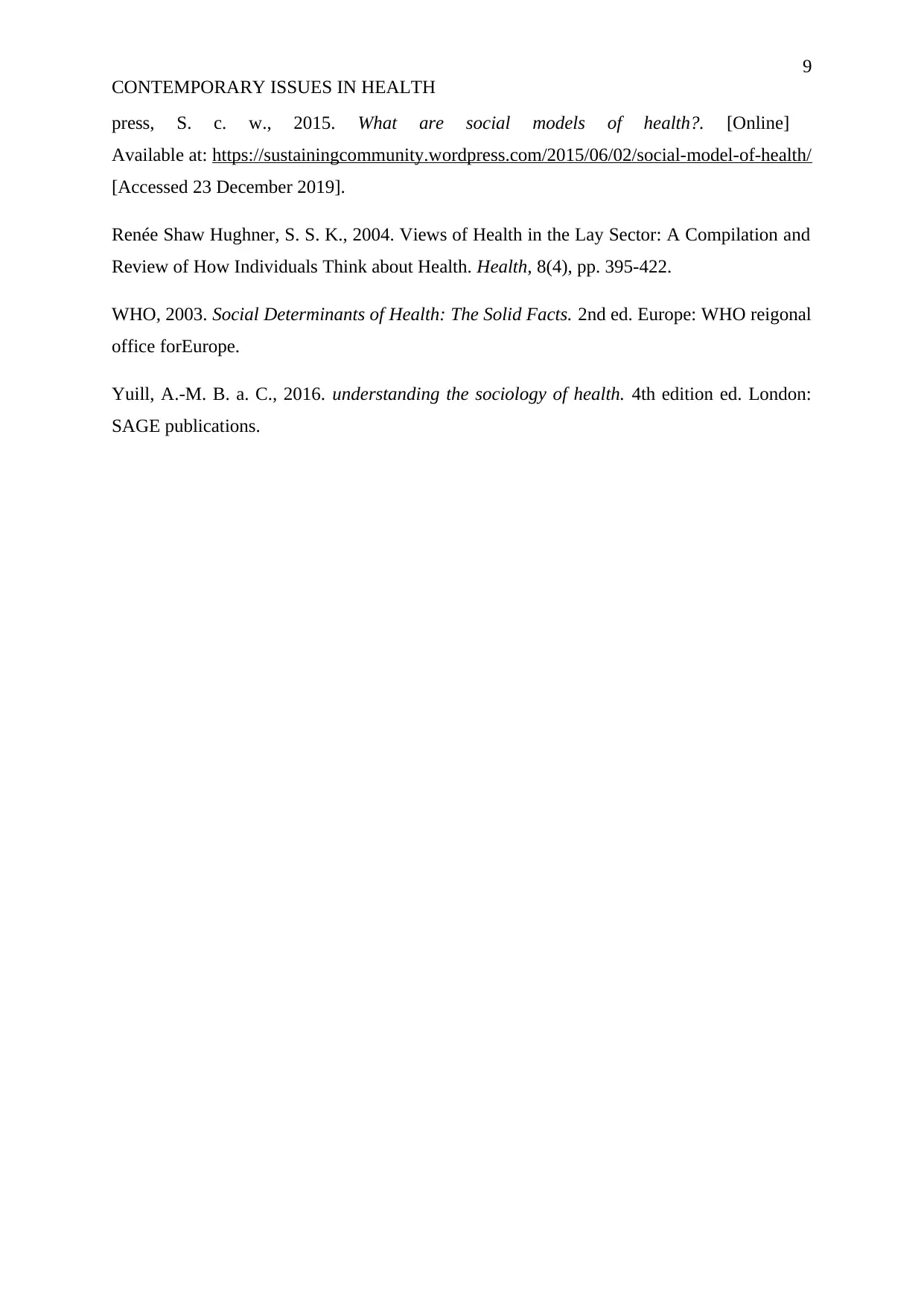
9
CONTEMPORARY ISSUES IN HEALTH
press, S. c. w., 2015. What are social models of health?. [Online]
Available at: https://sustainingcommunity.wordpress.com/2015/06/02/social-model-of-health/
[Accessed 23 December 2019].
Renée Shaw Hughner, S. S. K., 2004. Views of Health in the Lay Sector: A Compilation and
Review of How Individuals Think about Health. Health, 8(4), pp. 395-422.
WHO, 2003. Social Determinants of Health: The Solid Facts. 2nd ed. Europe: WHO reigonal
office forEurope.
Yuill, A.-M. B. a. C., 2016. understanding the sociology of health. 4th edition ed. London:
SAGE publications.
CONTEMPORARY ISSUES IN HEALTH
press, S. c. w., 2015. What are social models of health?. [Online]
Available at: https://sustainingcommunity.wordpress.com/2015/06/02/social-model-of-health/
[Accessed 23 December 2019].
Renée Shaw Hughner, S. S. K., 2004. Views of Health in the Lay Sector: A Compilation and
Review of How Individuals Think about Health. Health, 8(4), pp. 395-422.
WHO, 2003. Social Determinants of Health: The Solid Facts. 2nd ed. Europe: WHO reigonal
office forEurope.
Yuill, A.-M. B. a. C., 2016. understanding the sociology of health. 4th edition ed. London:
SAGE publications.
1 out of 10
Related Documents
Your All-in-One AI-Powered Toolkit for Academic Success.
+13062052269
info@desklib.com
Available 24*7 on WhatsApp / Email
![[object Object]](/_next/static/media/star-bottom.7253800d.svg)
Unlock your academic potential
© 2024 | Zucol Services PVT LTD | All rights reserved.





